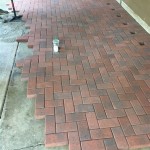Should You Seal Your Concrete Patio? A Comprehensive Guide
Concrete patios offer a durable and versatile outdoor living space. However, their porous nature makes them susceptible to various forms of damage, leading homeowners to consider sealing as a protective measure. Determining whether to seal a concrete patio involves weighing the potential benefits against the drawbacks, considering the specific patio's environment, and understanding the different types of sealers available.
Unsealed concrete readily absorbs water, chemicals, and oils. This absorption can result in staining, cracking, spalling (surface flaking), and the growth of mold and mildew. Sealing acts as a barrier, mitigating these risks and extending the lifespan of the patio. However, improper sealing or the selection of an inappropriate sealer can create further problems. A poorly applied sealer can trap moisture, leading to the very issues it's intended to prevent. Therefore, a carefully considered approach is essential.
Understanding the Benefits of Sealing a Concrete Patio
Sealing a concrete patio provides several distinct advantages. The primary benefit is protection against water penetration. Water absorption is a leading cause of concrete deterioration, particularly in climates experiencing freeze-thaw cycles. When water freezes inside the concrete's pores, it expands, exerting pressure that can cause cracking and surface damage. A sealer creates a hydrophobic barrier, preventing water from entering the concrete and mitigating this risk.
Another significant benefit is stain resistance. Concrete is porous and readily absorbs spills, such as oil, grease, wine, and plant matter. These stains can be difficult or impossible to remove, diminishing the aesthetic appeal of the patio. A sealer creates a protective layer that prevents these substances from penetrating the concrete, making cleanup easier and preserving the patio's appearance.
Sealing also enhances the durability of the concrete surface. By preventing water and chemicals from penetrating, the sealer reduces the likelihood of chemical attack, which can weaken the concrete over time. This protective barrier helps maintain the structural integrity of the patio, extending its lifespan and reducing the need for costly repairs or replacements.
Furthermore, sealing can improve the aesthetic appeal of a concrete patio. Some sealers enhance the natural color of the concrete, while others can provide a glossy finish. This can give the patio a more polished and attractive look, improving the overall appearance of the outdoor living space. The type of finish will depend on the sealer selected.
Assessing the Potential Drawbacks of Sealing
While sealing a concrete patio offers numerous benefits, there are potential drawbacks that must be carefully considered. One significant concern is the possibility of trapping moisture within the concrete. If the concrete is not properly cured or if moisture is already present within the slab, applying a sealer can prevent this moisture from escaping. This trapped moisture can then lead to spalling, cracking, or the growth of mold and mildew beneath the sealer, causing more damage than if the concrete had been left unsealed.
The application process itself can also pose challenges. Proper surface preparation is crucial for a successful seal. The concrete must be clean, dry, and free of any existing coatings or contaminants. Failure to properly prepare the surface can result in poor adhesion of the sealer, leading to peeling, bubbling, or other unsightly defects. The application of the sealer must also be even and consistent to ensure uniform protection and appearance.
The type of sealer used is another critical factor. Different sealers have different properties and are suitable for different applications. Using the wrong type of sealer can lead to problems. For example, some sealers may be incompatible with the concrete mix or the climate in which the patio is located. Acrylic sealers, while often affordable, may not be as durable as epoxy or polyurethane sealers, especially in high-traffic areas or environments exposed to harsh weather conditions.
Maintenance is also an important consideration. Sealers are not permanent and will eventually wear down over time. Depending on the type of sealer used and the amount of traffic the patio receives, resealing may be required every few years. This adds to the overall cost of maintaining the patio and requires ongoing effort.
Furthermore, some sealers can alter the slip resistance of the concrete surface. A glossy sealer can make the patio more slippery, especially when wet, posing a safety hazard. It is important to choose a sealer that provides adequate slip resistance or to add a non-slip additive to the sealer before application.
Factors to Consider Before Sealing Your Concrete Patio
Before deciding to seal a concrete patio, several factors should be carefully considered. The age and condition of the concrete are crucial. New concrete should be allowed to cure for at least 28 days before being sealed. This allows the concrete to fully hydrate and release any excess moisture. Older concrete should be thoroughly inspected for cracks, spalling, or other damage. Any necessary repairs should be made before sealing. It is also important to clean the concrete thoroughly to remove any dirt, debris, or existing coatings.
The climate and environmental conditions in which the patio is located also play a significant role. In regions with severe winters and frequent freeze-thaw cycles, sealing is particularly important to protect the concrete from water damage. In hot, sunny climates, sealing can help reduce the effects of UV exposure, which can cause the concrete to fade and deteriorate over time. The presence of nearby trees or vegetation can also affect the decision to seal, as falling leaves, sap, and other organic matter can stain the concrete.
The intended use of the patio is another important consideration. A patio used frequently for entertaining or dining will be subjected to more spills and traffic than a patio used primarily for relaxation. In high-traffic areas, a more durable sealer, such as an epoxy or polyurethane sealer, may be necessary to provide adequate protection. If the patio is located near a pool or other water source, a water-resistant sealer is essential to prevent water damage. The aesthetic preferences of the homeowner should also be taken into account when choosing a sealer, as different sealers offer different finishes and levels of gloss.
Cost is a factor that often influences decision-making. The cost of sealing a concrete patio can vary depending on the type of sealer used, the size of the patio, and whether the work is done by a professional or by the homeowner. DIY sealing can save money on labor costs, but it also requires more time and effort and may not produce the same results as professional application. Professional sealing services typically include surface preparation, sealer application, and cleanup. It is important to obtain multiple quotes from different contractors before making a decision.
Finally, it's wise to consider alternatives to sealing. Instead of sealing, employing regular cleaning and preventative maintenance can help preserve the concrete's condition. This includes sweeping the patio regularly to remove dirt and debris, promptly cleaning up spills, and using mild detergents to wash the surface periodically. While these measures may not provide the same level of protection as a sealer, they can help extend the lifespan of the patio and prevent staining and damage.

Why You Should Seal Your Concrete Driveway Or Patio Gleam Team

How To Seal A Concrete Patio

How Often Should You Reseal Your Concrete Increte Of Houston

2 Reason Concrete Patios Should Be Sealed Patriot

How To Seal Concrete Sealing In 7 Steps Network

Sealing Your Patio Pros And Cons

How To Seal Concrete For A Uniform Appearance Decor

How To Seal A Concrete Patio Once U C Coatings

Concrete Stain And Sealer Patio Makeover Exchange

Should I Put Concrete Sealer Around My Pool N M Restoration
Related Posts








